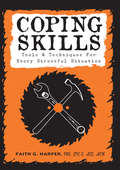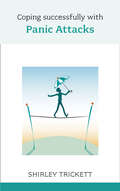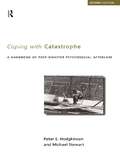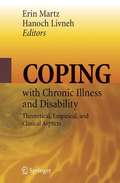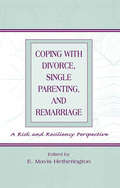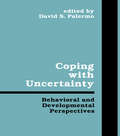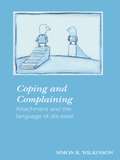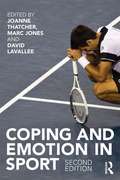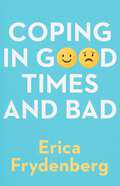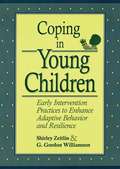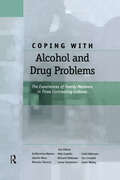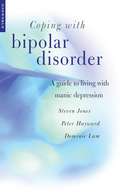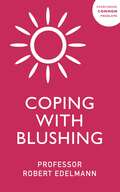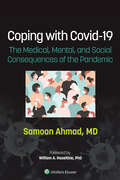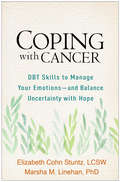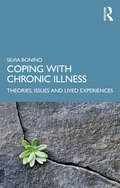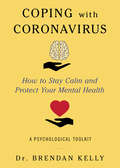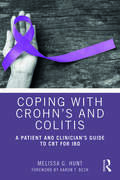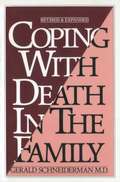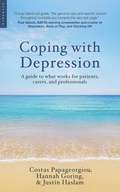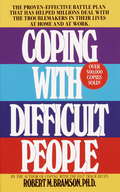- Table View
- List View
Coping Skills: Tools & Techniques for Every Stressful Situation
by Faith G. Harper, PhD, LPC-S, ACS, ACNYou know those days when you just can't even? When everything is haywire and everyone, including yourself, seems to be against you, not to mention against reason? Your to-do list is a mile long, your kid is sick, traffic sucks, and you just spilled coffee all over yourself as you were about to walk out the door? How do you cope? Most of us don't have great coping skills, and turn instead to addictions, zoning out, or freaking out. Dr. Faith, author of the bestselling Unfuck Your Brain, offers a range of healthier strategies for getting through tough moments, gaining perspective, and shifting your attitude.This book teaches you different strategies for different types of situations, and includes skills from many methodologies, including CBT, DBT, ACT, Positive Psychology, Mindfulness-based Stress Reduction, Somatic Experiencing, Jungian therapy, and more.
Coping Successfully with Panic Attacks
by Shirley TrickettPanic attacks happen when the body's emergency button is being pressed continuously. Breathlessness, chest pains, sweating, shaking, dizziness and fainting are all among the symptoms, and the experience can be terrifying. Fluctuating blood-sugar levels, anxiety and exhausted nerves affecting muscle tension and breathing can all cause panic attacks. This book explains how to stop pressing the panic button. Shirley Trickett shows how to understand your inner self, and overcome panic attacks with a balanced approach to meet your physical and emotional needs.
Coping With Catastrophe: A Handbook of Post-disaster Psychological Aftercare
by Michael Stewart Peter E. HodgkinsonCoping with Catastrophe is a practical handbook for people who provide psychosocial aftercare for victims of disasters. This completely revised and updated second edition includes the latest findings on the nature and effects of trauma, the psychological debriefing process and the effects of emergency work, and the latest treatment models for post-traumatic stress and abnormal grief. Eminently practical and easy to read, Coping with Catastrophe provides readers with information and skills to respond effectively and confidently to the needs of disaster survivors. It will be of immense value to a wide variety of helping professionals and carers, including social workers, psychologists, doctors, voluntary counsellors, and all those whose work brings them into contact with disaster victims.
Coping With Chronic Illness And Disability: Theoretical, Empirical, And Clinical Aspects
by Erin Martz Hanoch LivnehThis book synthesizes the expanding literature on coping styles and strategies by analyzing how individuals with CID face challenges, find and use their strengths, and alter their environment to fit their life-changing realities. The book includes up-to-date information on coping with high-profile conditions, such as cancer, heart disease, diabetes, arthritis, spinal cord injuries, and traumatic brain injury, in-depth coverage of HIV/AIDS, chronic pain, and severe mental illness, and more.
Coping With Divorce, Single Parenting, and Remarriage: A Risk and Resiliency Perspective
by E. Marvis HetheringtonIn this volume leading researchers offer an interesting and accessible overview of what we now know about risk and protective factors for family functioning and child adjustment in different kinds of families. They explore interactions among individual, familial, and extrafamilial risk and protective factors in an attempt to explain the great diversity in parents' and children's responses to different kinds of experiences associated with marriage, divorce, life in a single parent household, and remarriage.
Coping With Loss
by Susan Nolen-Hoeksema Judith Larson Judith M. LarsonCoping With Loss describes the many ways in which people cope with the death of someone they love. Most earlier books on bereavement have fallen into two categories: distillations of the clinical experience of individual therapists or collections of chapters reporting the results of empirical studies. Each category is valuable but has tended to serve a narrow group of readers--practitioners with particular theoretical orientations or researchers in quest of the latest findings. Coauthored by a leading research psychologist and an experienced therapist who specializes in bereavement education and intervention, this book is different. The authors weave together the strands of theory, research, and clinical wisdom into a seamless and readable narrative. While they discuss previous work, they also present new data, never before published, from one of the largest studies of bereaved people ever conducted, the Bereavement Coping Project. Unlike most studies to date, which focused on only one type of bereaved group (usually widows or widowers), the Bereavement Coping Project examined the experiences of several different groups during the first l8 months after the death. The groups included those who had lost a spouse, a parent, an adult sibling, or a child; and those who had lost their significant other to cancer or cardiovascular disease on one hand as opposed to the stigmatized disease of AIDS on the other. The book begins with a critical overview of theories of bereavement; succeeding chapters explore in depth the impact of specific types of loss, the impact of particular coping strategies on recovery; the impact of social supports and religion, and the special cases of children and of people who seem to grow and change for the better after a loss. A final chapter considers implications for intervention with bereaved people. Each chapter is richly illuminated with real-life examples throughout and ends with a section called "Voices" in which bereaved people describe their various attempts to cope in their own words. Insightful and informative.
Coping With Uncertainty: Behavioral and Developmental Perspectives (Penn State Series on Child and Adolescent Development)
by David S. PalermoThe first volume in this new series from The Center for the Study of Child and Adolescent Development at The Pennsylvania State University focuses on the relationship between the biological stress circuits and the behavioral concomitants to stress in animals and humans. The participants at this conference, a tribute to Dean Evan G. Pattishall, Jr., discuss the developmental implications of their work in relation to the periods of infancy, childhood, and adolescence. For professionals, clinicians, and researchers in clinical, developmental, experimental, and health psychology, behavioral medicine, psychiatry, psychotherapy, and the neurosciences.
Coping and Complaining: Attachment and the Language of Disease
by Simon R. WilkinsonGood clinical practice is impossible without an understanding of the ways in which patients present their complaints. Patients have their own styles of coping and of expressing their concerns, and without a clear understanding of these the clinician may find successful and swift diagnosis and treatment much harder to achieve. Coping and Complaining provides essential guidance for clinicians on how to identify various coping styles, and how to improve the quality of discourse with people of different backgrounds and ages.Drawing on a diverse range of evidence from such areas as developmental psychology, and theories on learning and memory, Coping and Complaining provides essential information on identification of patients' coping styles, focusing on such areas as:· The latest developments in attachment theory· The neurobiology of emotional development, and the biology of language development· Primary processes in early development· Communication, role play, the moral order of the consultation, and emotional first aid· Consequences for preventive medicineCoping and Complaining presents stimulating new approaches to consultations with patients and creative new ways of looking at health promotion.
Coping and Emotion in Sport: Second Edition
by Joanne Thatcher Marc Jones David LavalleeThe emotional highs and lows of competitive sport, whether experienced as a competitor, spectator or coach may be the essential ingredient that gives sport its universal and compelling appeal. Emotion is clearly a pervasive force within competitive sport, and this is reflected in the burgeoning interest over recent decades in athletes’ emotions and strategies for coping with these emotions. The interplay between emotion and coping is a critical factor in determining, through its influence on key psychological functions, an athlete’s potential success in competitive sport. This fully revised and updated edition of the classic text on coping and emotion in sport goes further than any other book in examining the central role that these two factors play in sports performance. The book explores theory and measurement, current research, and contemporary issues and special populations respectively. Each chapter closely integrates cutting-edge research themes with discussion of practical and applied issues, with case studies and reflections from practitioners working in elite sport woven throughout the book. With contributions from leading international scholars and consultant psychologists, this book is vital reading for all students and professionals working in sport psychology.
Coping in Good Times and Bad
by Erica FrydenbergNo one thinks about how well they are coping with life&’s daily stresses until they are not. Coping in Good Times and Bad brings together what we know about coping so we can create a life of health, joy, satisfaction, resilience and wellbeing, with an update on how to deal with the newer pressures of cost of living. &‘Coping&’ and &‘resilience&’ have become very commonly used words, especially in our world full of stresses, both big and small, along with the challenges that confront us, so what we need is a template for a good life. Decades of research, teaching and professional practice have provided psychologist Erica Frydenberg with intimate insight into how and why we cope well and not so well, and practical ways of developing and refining our coping strategies. Integrating coping with key proven ideas in contemporary psychology such as emotional intelligence, mindset, mindfulness and grit, she goes beyond focusing on particular kinds of crises—trauma, relationship breakdown, anxiety—to addressing the need for a framework that strengthens us through life, in good times and bad. &‘I&’m impressed by the breadth of its scope and by the constant references back to the research that underpins it … I&’m not sure if &“masterpiece&” has become an unacceptable term these days … I hope not, because that&’s what [this book] is.&’ Hugh Mackay
Coping in Good Times and Bad: Developing Fortitude
by Erica FrydenbergNo one thinks about how well they're coping with life's daily stresses, until they're not. Coping in Good Times and Bad brings together what we know about coping so we can create a life of health, joy, satisfaction, resilience and wellbeing. 'Coping' and 'resilience' have become very commonly used words, especially in our COVID-impacted world, but what we need is a template for a good life. Decades of research, teaching and professional practice have provided psychologist Erica Frydenberg with intimate insight into how and why we cope well and not so well, and practical ways of developing and refining our coping strategies. Integrating coping with key proven ideas in contemporary psychology, such as emotional intelligence, mindset, mindfulness and grit, she goes beyond focusing on particular kinds of crisis (trauma, relationship breakdown, anxiety), and addresses the need for a framework that strengthens us through life, in good times and bad.
Coping in Young Children: Early Intervention Practices to Enhance Adaptive Behavior and Resilience
by Shirley Zeitlin G. Gordon WilliamsonA guide for early intervention professionals describing the ways to assist children with disabilities to integrate and apply their developmental skills for greater flexibility and independent problem solving. Covers application of a theoretical frame of reference, assessment of children's coping styles, and collaborating with parents to facilitate adaptive functioning. Includes case histories and sample forms. Annotation copyright by Book News, Inc. , Portland, OR
Coping with Alcohol and Drug Problems: The Experiences of Family Members in Three Contrasting Cultures
by Jim Orford Alex Copello Carol Atkinson Richard Velleman Guillermina Natera Jazmin Mora Ian Crundall Marcela Tiburcio Lorna Templeton Gwen WalleyWhat difference does culture make? Coping with Alcohol and Drug Problems: The Experiences of Family Members in Three Contrasting Cultures aims to deepen and extend understanding of the experiences of family members trying to cope with the excessive drinking or drug taking of a relative. Comprehensive and thoroughly up to date, this book draws on the results of the cross-cultural study of alcohol and drug problems in the family, and places these results within the broader context of the international literature on the subject. By investigating the similarities and differences in the experiences of family members in three parts of the world, the authors reveal results which have far-reaching implications for professional intervention and prevention. Subjects covered include: models of understanding: how families continue to be pathologised and misunderstood. how family members cope. an integrated view of alcohol and drug problems in the family. ways of empowering family members. This book aims to demonstrate the possibility of a constructive alliance between professionals, substance misusing relatives, and the affected family members by thoroughly investigating the dilemmas that face family members and the lack of support they experience. This fascinating insight into the impact of alcohol and drug problems on family members will be a valuable resource for all those who are interested in substance misuse in family and cultural contexts, and particularly those who are interested in the treatment of alcohol and other drug problems.
Coping with Bipolar Disorder: A CBT-Informed Guide to Living with Manic Depression (Coping With...)
by Steven Jones Peter Hayward Dominic LamFully updated and revised, this new edition of Coping with Bipolar Disorder draws on the combined expertise of three leading specialists to offer a comprehensive and practical guide to the causes, treatment, and implications of bipolar disorder, or manic depression. Designed for people with the condition and those close to them, the authors use cognitive behavioural therapy to provide straightforward help with managing and controlling the condition, featuring advice on such key areas as mood monitoring; managing money; housing and social support; and sustaining happy relationships. With real-life case studies, helpful chapter summaries and a full list of support organizations and web groups, this guide will both inform and empower all those who live with the bewildering turbulence of bipolar disorder. Steven Jones is Senior Lecturer in Clinical Psychology at the University of Manchester. Peter Hayward is a Consultant Clinical Psychologist at the South London and Maudsley NHS Trust on in London. Dominic Lam is a Senior Lecturer in Clinical Psychology at the Institute of Psychiatry
Coping with Blushing
by Robert Edelmann Robert J. Edelmann'I just couldn't stop blushing... It was awful!' It's the thing you dread most. You're at a party, giving a presentation, joining a new evening class or even meeting your online date in real life for the first time. You feel the warmth creeping up over their face - you know they've noticed, and now they'll think you're socially inept, or awkward, or nervous. The more embarrassed you feel, the more you blush.But it doesn't need to be this way. Blushing is not something to be feared, and there are ways to break the cycle and regain control of your anxiety. Professor Edelmann offers proven, practical and easy to manage strategies to unlearn feelings of failure, and to not only survive but thrive in any social or professional situation.
Coping with Blushing
by Robert Edelmann Robert J. Edelmann'I just couldn't stop blushing... It was awful!' It's the thing you dread most. You're at a party, giving a presentation, joining a new evening class or even meeting your online date in real life for the first time. You feel the warmth creeping up over their face - you know they've noticed, and now they'll think you're socially inept, or awkward, or nervous. The more embarrassed you feel, the more you blush.But it doesn't need to be this way. Blushing is not something to be feared, and there are ways to break the cycle and regain control of your anxiety. Professor Edelmann offers proven, practical and easy to manage strategies to unlearn feelings of failure, and to not only survive but thrive in any social or professional situation.
Coping with COVID-19: The Medical, Mental, and Social Consequences of the Pandemic
by Samoon AhmadCoping with COVID-19: The Medical, Mental, and Social Consequences of the Pandemic provides readers with unique and timely insights about the single most disruptive and epoch-defining public health event of the last 100 years. Written in an easy-to-read and accessible style, widely respected psychiatrist and author Dr. Samoon Ahmad explores both the science of the virus and the lasting psychological, clinical, and professional implications of the pandemic in two well-organized parts. The first part of the book examines the historical precedents of pandemics, as well as the virology and symptomology of SARS-CoV-2. The second part covers the broader effects of the pandemic on society with special consideration being given to its impact on public health policy, the medical industry, and the individual psychology of children and adults.
Coping with Cancer: DBT Skills to Manage Your Emotions--and Balance Uncertainty with Hope
by Marsha M. Linehan Elizabeth Cohn StuntzThis compassionate book presents dialectical behavior therapy (DBT), a proven psychological intervention that Marsha M. Linehan developed specifically for the impossible situations of life--and which she and Elizabeth Cohn Stuntz now apply to the unique challenges of cancer for the first time. *How can you face the fear, sadness, and anger without being paralyzed by them? *Is it possible to hold on to hope without being in denial? *How can you nurture supportive relationships when you have barely enough energy to take care of yourself? Learn powerful DBT skills that can help you make difficult treatment decisions, manage overwhelming emotions, speak up for your needs, and tolerate distress. The stories and collective wisdom of other cancer patients and survivors illustrate the coping skills and show how you can live meaningfully, even during the darkest days.
Coping with Choices to Die
by C. G. PradoThis book examines the reactions of the friends and family of those who elect to die due to terminal illness. These surviving spouses, partners, relatives, and friends, in addition to coping with the death of a loved one, must deal with the loved one's decision to die, thus severing the relationship. C. G. Prado examines how reactions to elective death are affected by cultural influences and beliefs, particularly those related to life, death, and the possibility of an afterlife. Understanding the role of these cultural influences on the grieving processes of survivors is a crucial step in allowing them to accept both intellectually and emotionally the finality of elective death and to deal with the decision of their loved one.
Coping with Chronic Illness: Theories, Issues and Lived Experiences
by Silvia BoninoThis valuable book combines psychological theories of health with the lived experience of coping with chronic health conditions, focusing on the "ill person" as an actor of their own development. It draws on perspectives from developmental and health psychology alongside the author’s personal experience of chronic illness. Bonino considers all aspects of living with illness, from issues that impact on everyday functioning such as pain and fatigue, to the rebuilding of identity through meaningful new goals and effective actions, and the development of therapeutic relationships. Psychological theories are interweaved with descriptions of lived encounters to center the experience of the person living alongside illness and provide insightful points of reference that everyone could try to use when facing the challenges of chronic disease in the course of their daily lives. Coping with Chronic Illness is important reading for those living with chronic health conditions, as well as for healthcare professionals looking to gain awareness of the psychological issues caused by living with illness. It is also of interest for postgraduate students of health psychology.
Coping with Coronavirus: How to Stay Calm and Protect Your Mental Health: A Psychological Toolkit
by Brendan KellyHow worried should I be? What information can I trust? What should I tell the children? Can I survive the panic, let alone the virus? These are certainly challenging, unprecedented times. Allow pre-eminent psychiatrist Dr. Brendan Kelly to help you understand and cope with the unique stresses of today, as we all try to deal with the threat of COVID-19 within our homes, communities and throughout the world. The anxiety associated with the coronavirus crisis is different to the anxiety seen in traditional disorders, because demonstrably there is something to fear, and that&’s what makes this worry so ubiquitous, so persistent and so challenging to manage. The good news is that, just as we are capable of finding sophisticated ways to make ourselves more anxious, we are equally good at finding sophisticated ways to manage our mental health, once we put our minds to it. Anxiety-management techniques help hugely once they are modified to suit the new situation we face, and in Coping with Coronavirus, Dr Brendan Kelly will give you all the practical tools you and your family need to navigate these dark, uncertain days. Both the author and the publisher are donating their proceeds from this book to charity.
Coping with Crohn’s and Colitis: A Patient and Clinician’s Guide to CBT for IBD
by Melissa G. HuntThis practical guide provides patients who have inflammatory bowel disease (IBD) with cognitive-behavioral therapy (CBT) strategies for coping with IBD. It teaches a number of skills that can make coping with Crohn’s or colitis easier. Chapters provide an overview of Crohn’s and colitis as well as the interplay between stress and the gut, before offering strategies on relaxation training, physical activity, managing stress and avoidance, diet and nutrition, and medical treatment options. The book also emphasizes the importance of the doctor-patient relationship and helps patients learn how to think about medical management (including the possibility of surgery) to minimize anxiety from catastrophic thoughts and balance potential risks and benefits appropriately. Dr. Hunt challenges readers to engage in specific behavioral experiments to reduce shame and stigma and highlights practical applications with case illustrations and clinical vignettes. This book can be used as a standalone self-help book or in conjunction with practitioners during in-person therapy.
Coping with Death In the Family
by Gerald Schneiderman"A common sense guide for all age groups on how to live with the loss of a loved one." Dr. Gerald Schneiderman is on the staff of the Department of Psychiatry at the Hospital for Sick Children and is an Assistant Professor of Psychiatry and Pediatrics at the University of Toronto. His long term interest in fatal metabolic disease within the family and his work on the consequences of the death of a child within the family have led him to his present involvement with the research group studying the treatment of bereavement. "The book is far from frightening, rather a sensitive and objective look at how to deal with death with the help of others who have had to deal with it, in the context of family." – Sandra Naiman, The Toronto Sun. "This book does very well what it sets out to do. It is of value not only for bereaved family members, but also for counselors, psychotherapists, and all professionals…who deal with death and with the bereaved ones." – Joseph C. Finney, MD, JD, Loyola University, Stritch School of Medicine, Journal of Marital and Family Therapy. "Schneiderman has provided…workable ways to cope, not just with the stress of death, but also with the reality of life–being a survivor." – Stephen I. Katz, Ph.D, Veterans Administration Medical Center, Palo Alto, California, Family Process.
Coping with Depression: A Guide to What Works for Patients, Carers, and Professionals
by Costas Papageorgiou Hannah Goring Justin HaslamDepression affects almost 10% of people in the US. It can be an incredibly debilitating and isolating condition, with episodes recurring throughout a person's life. However, the good news is that with the right guidance it is possible to make a complete recovery. Drawing on a wealth of clinical expertise, the authors have created an easy-to-use manual that explains everything you need to know about the condition, from how to recognise the symptoms to the range of treatments currently available, including behavioural therapies, professional support, and medication. Case histories of people who have benefitted from the treatments discussed are featured throughout, encouraging individuals suffering from depression, as well as those around them, to take an active role in getting better and staying well. Dr Costas Papageorgiou is a Consultant Clinical Psychologist with extensive clinical and research experience in depression and anxiety disorders. Dr Hannah Goring is a Clinical Psychologist, and Dr Justin Haslam is a Staff Consultant Psychiatrist.
Coping with Difficult People: The Proven-Effective Battle Plan That Has Helped Millions Deal with the Troublemakers in Their Lives at Home and at Work
by Robert M. BramsonBosses, friends, family members, they've made your life hell -- until now! Based on fourteen years of research and observation, Dr. Robert Bramson's proven-effective techniques are guaranteed to help you right the balance and take charge of your life. Learn how to: Stand up to anyone -- without fighting. Blunt a sniper's attack. Get a clam to talk. Cut off a Sherman tank at the pass. Manage bulldozers. Get stallers off the dime. Move a complainer into a problem-solving mode. Learn the six basic steps that allow you to cope with just about anyone. Reclaim the power the rightfully belongs to you in any relationship!
